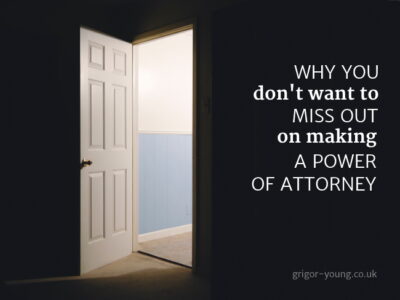Under conditions of social distancing, it’s more difficult to make a Will or Power of Attorney.
But it is not impossible.
The Law Society of Scotland has issued guidelines as to how it is still possible for solicitors to take instructions to prepare Wills and Powers of Attorney for clients and for clients to get them signed.
When opportunities become scarce, we tend to have a greater desire for them.
This is why advertisers often emphasise that a sale will not last forever.
When something is hard to get, it makes us more inclined to buy it. We see opportunities as more valuable if they have limited availability. We hate missing out.
There will be other reasons, no doubt, but the increased difficulty in getting your Will or Power of Attorney done seems to be a factor in the increasing number of enquiries we are receiving about these forms of forward planning.
Ideally, you should have both a Will and a Power of Attorney.
They perform different functions.
A Will sets out how you want your estate to be distributed on your death. Your wishes can include – if you are the parent or carer of a child – appointment of a guardian to take over their care on your death.
A Power of Attorney gives power to another person to make decisions for you or act on your behalf if you no longer have the capability to do that (or if you simply no longer wish to have the responsibility of making your own decisions).
Here’s a commonly-misunderstood point…
If you lose legal capacity then your spouse or partner will be able to act on your behalf? No.
Unfortunately, if you lose legal capacity without having a Power of Attorney in place, it will probably be necessary to apply to the local Sheriff Court for a Guardianship order (which is completely different from the appointment of guardian to a child referred to above).
Applying to the court for a guardianship in respect of an incapacitated adult can be time-consuming and costly.
Under the present social-distancing conditions, with the Scottish Courts system operating at a drastically reduced level from normal, guardianship applications under the Adults with Incapacity legislation are mostly stalled.
Once you lose capacity, you cannot grant a Power of Attorney. A Power of Attorney can only be put in place by a person who has legal capacity. If you lose capacity and you don’t already have a Power of Attorney in place, the only route is a guardianship application as described above.
The process of getting a Power of Attorney in place can be quick and straightforward.
The work is usually done for a fixed cost. With the guidance recently issued by the Law Society of Scotland, it will still be necessary for your solicitor to ‘see’ you before any documents are signed but that can take place if necessary by video conference via apps such as Zoom and WhatsApp.
Why you don’t want to miss out…
The principal reason why you don’t want to miss out on making a Power of Attorney is that it can become ‘too late’ to do so. If you lose capacity, those closest to you will have to go through the much more complicated process of a Guardianship application.
Beyond that, with Power of Attorney, you get to choose your attorney or attorneys. You don’t get to have a say in who will be appointed your Guardian.
How we can help
If you have any questions at all about granting a Power of Attorney or making a Will, please do not hesitate to contact us. You can phone us on 01343 544077 or you can send us a Free Online Enquiry via this website. All initial enquires are free of charge and without obligation to take matters further. We are here to help.
We’re always happy to receive questions because they allow us to review and expand on the information on this website – for everyone’s benefit. So please do get in touch if you have any supplementary questions arising from this article.
Post header image credit: Photo by Matthew T Rader on Unsplash


 The myth that everything goes to your spouse if you don’t have a Will
The myth that everything goes to your spouse if you don’t have a Will